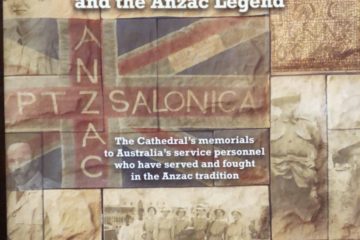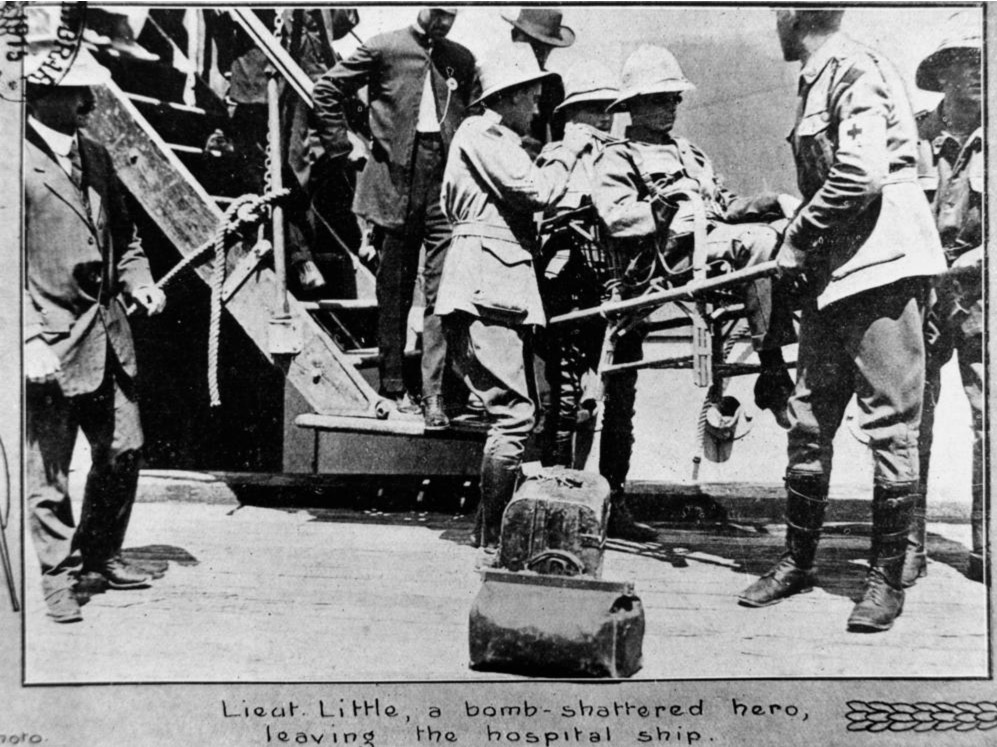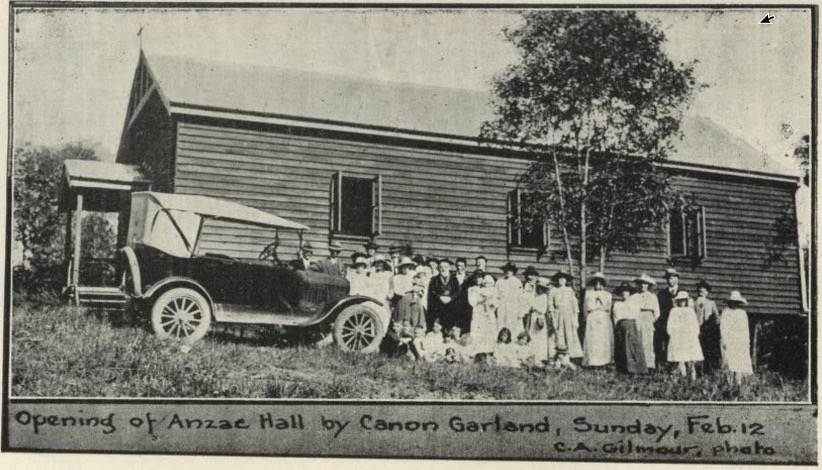Our Soldier Boys
‘Nothing is too good
for our Soldiers.’
A LETTER TO
THE CLERGY OF THE
CHURCH OF ENGLAND
Reverend and dear Sir,—
WE desire to bring before you the claims which the Soldiers’ Church of England Help Society has upon members of the Church of England for their liberal support.
We have been at work for four months, in which time there have been erected five recreation tents in the camps.
The cost, including furnishing and maintenance during that time, amounted to £451.
To that must be added £139, the cost of Prayer Books given to the soldiers on leaving – making our total expenditure £590.
All this has been raised without any interference with Diocesan or Parochial Funds.
In other places large Diocesan grants have been made for similar work.
We want it to be the pride of the Church of England in Queensland that our work, which has been established by individual generosity, will continue to be maintained without any appeal to Diocesan funds, and without any interference with Parish funds.
We feel that Church people have only to be told of this great work and its needs, to ensure liberal and regular support so long as the War lasts.
We ask you, Sir, to be so good as to plead the soldiers’ cause with the parishioners, and ask them to help this work without diminishing anything from their ordinary Church subscriptions.
The work done has justified itself, if we may judge from the soldiers themselves, from their relatives and friends; and from opinions expressed by the military authorities; but the time has now come when the work cannot be continued without definite regular support.
We estimate it will be necessary to provide at least £60 a month to maintain the work so far established; but that limit would make no provision for any future development.
Any donations over £60 would help us to open up in other camps not yet touched by us.
At the present moment the best appreciation of the work is shown by the demand from officers and men that we should open up in those camps where we have not yet got a tent.
We could easily do this by going into debt, but our principle is to incur only such expenditure as can be met.
If Church people could see the way in which our soldier boys are turning to their Church as they have never turned before, the fount of individual generosity would still more widely run – even if it meant some considerable sacrifices.
Far better some of the criticism we are hearing of the soldiers’ conduct, would be the providing more recreation tents where the men would find an attractive home during the long evening hours, which are the greatest trial to our boys in their new soldiering life.
Amongst the branches of our work are included regular visiting of the Camps by our Brisbane members – constant visits being paid for sewing and making friends with the men; concerts are provided weekly; but it can easily be understood that visits or concerts can only be undertaken where we have a home of our own in the camp.
To provide these homes, i.e., a recreation tent, costs in each case £100.
We entertain weekly about 100 soldiers to tea in the Cathedral Schoolroom, and all these things are done without drawing on our General Fund – being provided by our Brisbane members.
Our Brisbane members also visit the relatives of soldiers still in camp, and of those who have already gone to the Front.
We feel, therefore, we may appeal for wider support with every confidence that the Church of England will rise to the greatest opportunity she has ever had of reaching so many of her sons, at a time when they are asking for their own Church to help them, and are more than ready to listen to her than ever has happened before.
In our appeal we do not mention the spiritual side – leaving that to our chaplains; but it is almost imperative for the spiritual side that we should be able to show the men we are caring for them in less important things.
Indeed, without this side our chaplains could not reach their men in anything like an effective manner.
Although more than half the soldiers belong to the Church of England, yet to the members of our Society, it is a delight that while as a Church we provide the whole cost of our social work, it is freely offered to, and as readily accepted by, soldiers of all denominations.
The most each one of us could do would be too little for our boys, who are offering their lives to save us from German frightfulness.
“Nothing that we can do is too good for our soldiers”, and that without asking any return except the knowledge that we are helping them to be better soldiers, and making the burden and restraints less irksome for them.
– [ signed ] Alice Morgan, Clinton, Paddington, Patroness.
– Christian Westgarth Chubb, neé Macarthur, Hampstead Road, South Brisbane, President.
– Marjorie Le Fanu [ Mary (Margery) Annette Ingle Le Fanu, neé Dredge ], Bowen Bridge Road, Brisbane;
E.O. Lee [ Emma Onus Lee ], Victoria Barracks, Brisbane;
Mary Campbell, Glenelg Street, South Brisbane,
Vice-Presidents.
Martha Atkinson, Coorparoo, General Secretary.
Ethel Walsh, Milton, Treasurer.
Brisbane, 15th September 1915.
I cordially endorse this appeal. Apart from from all else, the mere size of the work must appeal to us. The Camps now amount to a huge new parish of eight to ten thousand souls – all men. And the proportion of Churchmen there must be greater than in ordinary parishes. Later on, if the war continues, we shall have to make another effort for the “Military Chaplain’s Fund” which will not benefit by this present appeal. But I am not anxious as to the result. The spiritual opportunity in the Camps is of unique and paramount importance, and worth all the sacrifice we may be called upon to make.
– ST. CLAIR BRISBANE
Bishopsbourne, Brisbane,
September 21st, 1915.
– from page 203 of “The Church Chronicle” monthly journal of the Anglican Diocese of Brisbane, 1 October 1915.
PICTURED ABOVE: Through a relentless public fundraising campaign, the members of the Brisbane-based Soldiers’ Church of England Help Society by 1919 had purchased “Ervingston”, the former inner-city editorial offices of “The Brisbane Courier” and “The Queenslander” newspapers, at the corner of George and Charlotte Streets – a former pub built in 1861 by Alexander “Sandy” McIntyre. The caption from this image which appeared in “The Queenslander Pictorial” of 10 May 1919 (page 27) read: “The NEW ANZAC CLUB HOSTEL IN GEORGE-STREET, BRISBANE. Ervingston, at the corner of George and Charlotte Streets, has recently been acquired by the Church of England Help Society, which has established it as a club for returned soldiers. The building was the office of The Queenslander and The Brisbane Courier until the late seventies. It has since been occupied as a boarding house.” This image is from the collection of the State Library of Queensland.

ABOVE: “Ervingston” purchased and to be turned over for temporary boarding accommodation of servicemen returning from the battlefields of Europe. This item appeared on page 5 of Brisbane’s “The Daily Standard” newspaper of 9 May 1919.

ABOVE: In a later incarnation, “Ervingston” became the “Elizabeth Kenny Clinic” where legendary nursing sister, Elizabeth Kenny, pioneered research into childhood infantile paralysis and poliomyelitis. These photographs appeared on page 11 of Brisbane’s “The Telegraph” newspaper of 11 June 1935. Dr Jean Rountree was the clinic’s inaugural superintendent.

ABOVE: Canon Garland was in the audience, along with his State Member of Parliament and the-then Home Secretary, Edward (“Ned”) Joseph Hanlon, for the showing of a movie about Sister Elizabeth Kenny’s progress in using innovative treatment regimes for infantile paralysis and poliomyelitis. This item appeared on page 5 of Brisbane’s “The Telegraph” newspaper of 17 April 1935.



